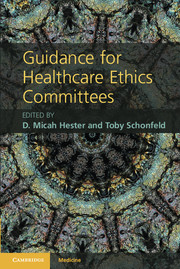Book contents
- Frontmatter
- Contents
- Contributors
- Preface
- Section 1 The Context of Healthcare Ethics Committee Work
- Section 2 Consultation
- 5 Mission, vision, goals: defining the parameters of ethics consultation
- 6 Ethics consultation process
- 7 Informed consent, shared decision-making, and the ethics committee
- 8 Decision-making capacity
- 9 Family dynamics and surrogate decision-making
- 10 Confidentiality
- 11 Advance care planning and end-of-life decision-making
- 12 Medical futility
- 13 Ethical issues in reproduction
- 14 Ethical issues in neonatology
- 15 Ethical issues in pediatrics
- Section 3 Policy Development and Organizational Issues
- Section 4 Educating Others
- Index
- References
8 - Decision-making capacity
Published online by Cambridge University Press: 05 August 2012
- Frontmatter
- Contents
- Contributors
- Preface
- Section 1 The Context of Healthcare Ethics Committee Work
- Section 2 Consultation
- 5 Mission, vision, goals: defining the parameters of ethics consultation
- 6 Ethics consultation process
- 7 Informed consent, shared decision-making, and the ethics committee
- 8 Decision-making capacity
- 9 Family dynamics and surrogate decision-making
- 10 Confidentiality
- 11 Advance care planning and end-of-life decision-making
- 12 Medical futility
- 13 Ethical issues in reproduction
- 14 Ethical issues in neonatology
- 15 Ethical issues in pediatrics
- Section 3 Policy Development and Organizational Issues
- Section 4 Educating Others
- Index
- References
Summary
Objectives
This chapter will help the Healthcare Ethics Committee (HEC) member:
Summarize the elements of decision-making capacity.
Describe why determination of decision-making capacity is essential for respecting autonomous patient choices.
Describe one common method and mnemonic for determination of decision-making capacity.
Describe the procedure to address any unresolved questions about the patient’s ability to make medical decisions.
Case
A 93-year-old woman with early dementia is brought in with cachexia (extreme weight loss). She is widowed. Her sole daughter assists her and is attentive to her. According to her daughter, the patient does not have a guardian. She has been bedbound for the past 2 months, has continued to lose weight, and refuses offered oral feeding, saying she will eat when she is hungry. The patient doesn’t know the date or year, but knows the season, and that she is in a hospital. She recognizes and responds to her daughter and to the physician, but doesn’t know the medications she is taking or her medical problems. “My daughter knows all that, and you should know it, too, since it’s somewhere in my chart in this place and you’re the doctor,” she says.
- Type
- Chapter
- Information
- Guidance for Healthcare Ethics Committees , pp. 55 - 62Publisher: Cambridge University PressPrint publication year: 2012



